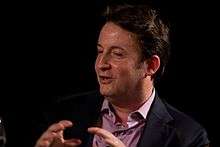András Szántó
András Szántó (born January 1, 1964) is a writer, researcher, and consultant in the fields of art, media, cultural policy, arts sponsorship, and philanthropy based in New York City.
András Szántó | |
|---|---|
 Szanto in 2011 | |
| Born | January 1, 1964 Budapest, Hungary |
| Alma mater | Columbia University, New York |
| Spouse(s) | Alanna Stang |
| Website | http://www.andras-szanto.com |
Career
Szántó attended the Budapest University of Economics (now Corvinus University), where his undergraduate thesis on forced resettlements in Stalinist Hungary resulted in a 1989 book on the subject.[1] He began graduate studies at Columbia University in New York City in 1988. His research there focused on social and commercial aspects of the visual arts. Szántó's 1996 Ph.D. dissertation, entitled Gallery Transformations in the New York Art World in the 1980's, examined New York City art galleries and changes in the nature of the environment for art during this period.[2]
From 1997—2005, Szántó was affiliated with Columbia's National Arts Journalism Program and was appointed director in 2004.[3] In 2005—10 he was director of the NEA Arts Journalism Institute in Classical Music and Opera, also at Columbia.[4] He has worked with the Metropolitan Museum of Art to develop its Global Museum Leaders Colloquium and has served as moderator of the biennial program since its inception in 2014.[5][6] Szántó has also served as Senior Lecturer at Sotheby's Institute of Art, New York City.[7] His firm, András Szántó LLC consults on cultural strategy and policy for cultural organizations, foundations, and corporations.[8]
Szántó’s writing on arts and cultural institutions has appeared in The New York Times, The Wall Street Journal, The Art Newspaper, Artforum, The American Prospect, and other publications. In the field of public affairs, he was a correspondent for Magyar Narancs and has published op-ed articles in The Boston Globe and Los Angeles Times. He organized a 2007 conference at the New York Public Library on political propaganda, and edited the companion book of essays, ' 'What Orwell Didn’t Know: Propaganda and the New Face of American Politics' '.[9]
In 2012, he moderated and wrote the summary report of a Salzburg Global Seminar, entitled Public and Private Cultural Exchange-Based Diplomacy: New Models for the 21st Century. [10] Also in 2012, he participated in and wrote the summary report for the Asia Society's US-China Museum Directors Forum in Beijing.[11]
Through his firm, Andras Szanto LLC, he consults on programming, marketing initiatives and strategic planning for corporations and non-profit organizations in the arts. His firm's non-profit clients include The Metropolitan Museum of Art, The Guggenheim Foundation, The Andy Warhol Foundation for the Visual Arts, The Pew Charitable Trusts, The National Endowment for the Arts, and the Museum of Fine Arts in Budapest. Corporate clients include Art Basel, The Absolut Company, and the Davidoff Art Initiative.[8]
Szántó has served on the advisory boards of Apexart, The Alliance for the Arts, The Gordon Parks Foundation, and the George H. Heyman Center for Philanthropy at NYU.
Personal life
He lives in New York City with his wife, Alanna Stang, and their two sons.
References
- Dessewffy, Tibor; Szántó, András (1989). Kitörő éberséggel: a budapesti kitelepítések hiteles története. Budapest: Háttér Lap- és Könyvkiadó. ISBN 9637403450.
- Szántó, András (1996). Transformations in the New York art world in the 1980's (PhD). Columbia University. OCLC 36996949.
- "Staff". National Arts Journalism Program. Archived from the original on 18 April 2005.
- Winzenried, Rebecca. "Premptive Strike: New New programs address cutbacks in newspaper arts coverage". League of American Orchestras. Retrieved 18 January 2020.
- "Metropolitan Museum to Inaugurate Global Museum Leaders Colloquium in Spring 2014". www.metmuseum.org. 2013. Retrieved 19 January 2020.
- Stapley-Brown, Victoria. "Met hosts group of international directors for the Global Museum Leaders Colloquium". www.theartnewspaper.com. Retrieved 18 January 2020.
- "Why the art market isn't hurtin' — yet". Art&Seek. 5 May 2008. Archived from the original on 25 January 2020.
- "Andras Szanto LLC". andras-szanto.com. Retrieved 18 January 2020.
- Szántó, András, ed. (2007). What Orwell Didn't Know: Propaganda and the New Face of American Politics. New York: Public Affairs. ISBN 1586485601.
- "Public and Private Cultural Exchange-Based Diplomacy: New Models for the 21st Century. Session 490". Salzburg Global Seminar. Retrieved 26 January 2020.
- "US–China Museum Leaders Forum". Asia Society. Retrieved 26 January 2020.
Selected publications
- Toward a Closer Understanding of Our Differences: Summary Report on the Second U.S.-China Museum Leaders Forum, Peggy Loar, Orville Schell, András Szántó, eds. New York: The Asia Society, 2015.
- From Bark to Snark: Arts Journalism Seeks Its Way in the Twenty-First Century. Journal of the Clark Art Institute, Vol. 16 (2015).
- What Orwell Didn't Know. New York: Public Affairs Press, 2007.
- A Portrait of the Visual Arts: Meeting the Challenges of a New Era. Arthur Brooks, Kevin McCarthy, Elizabeth Ondaatje, András Szántó, eds. Santa Monica: RAND Research in the Arts, 2005.
- The New Gatekeepers: Emerging Challenges to Freedom of Expression in the Arts, Christopher Hawthorne and András Szántó, eds. New York: National Arts Journalism Project and DAP, 2004.
- A New Mandate for Philanthropy? U.S. Foundation Support for International Arts Exchanges. Washington, DC: The Center for Arts and Culture, 2003.
- Hot and Cool: Some Contrasts between the Visual Art Worlds of New York and Los Angeles in New York & Los Angeles: Politics, Society, and Culture: A Comparative View, David Halle, ed. Chicago and London: University of Chicago Press, 2003.
- The Visual Art Critic: A Survey of Art Critics at General-Interest News Publications in America. New York: National Arts Journalism Project, 2002.
- Don’t Shoot the Messenger: Why the Art World and the Press Don’t Get Along in Unsettling Sensation: Arts-Policy Lessons from the Brooklyn Museum of Art Controversy, Lawrence Rothfield, ed. Rutgers, NJ: Rutgers University Press, 2001.